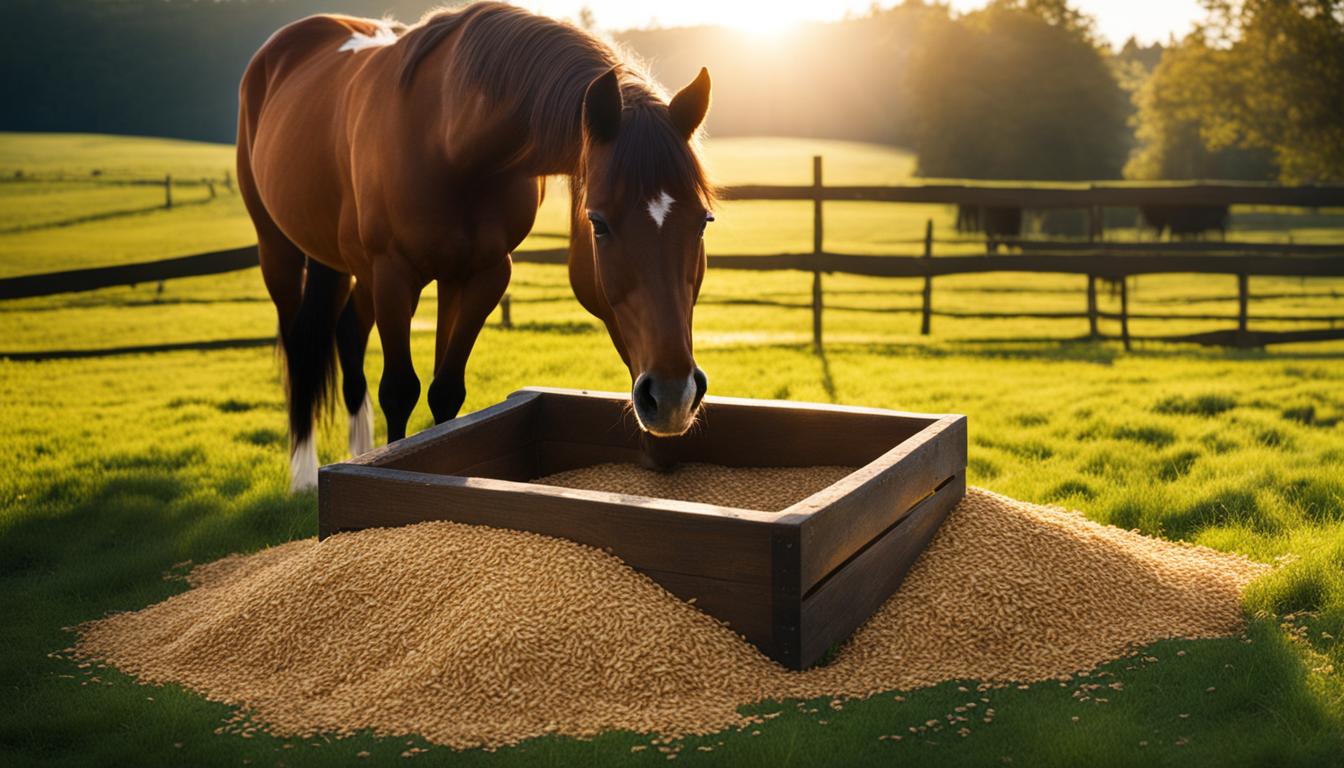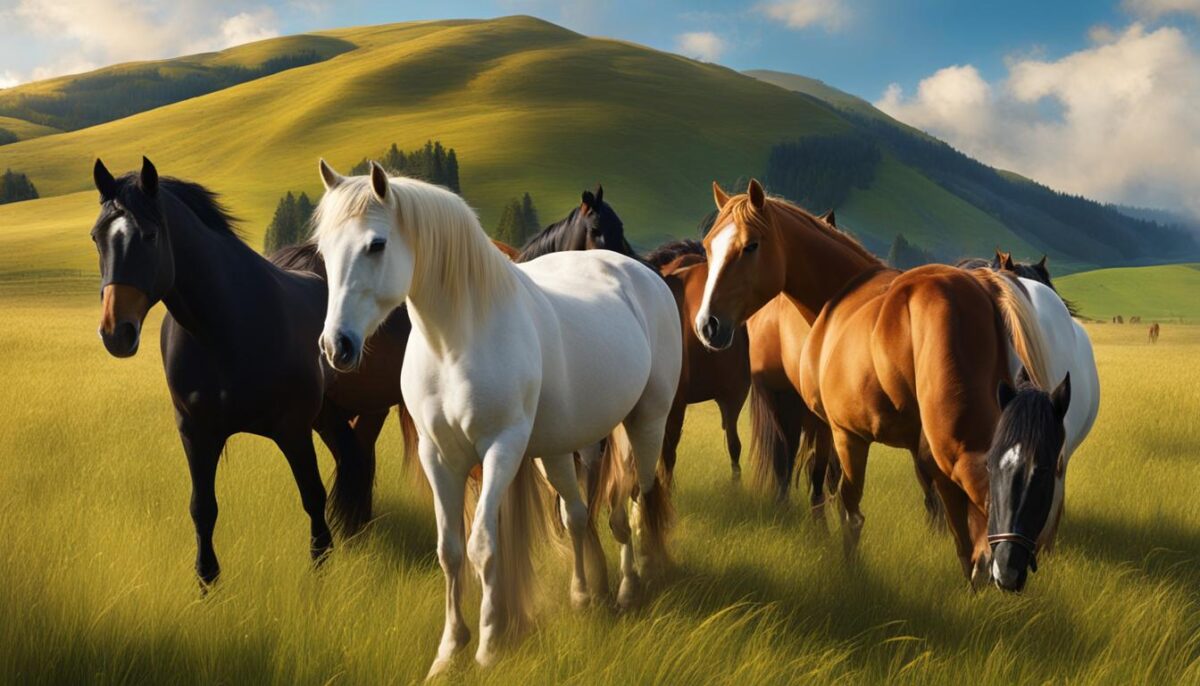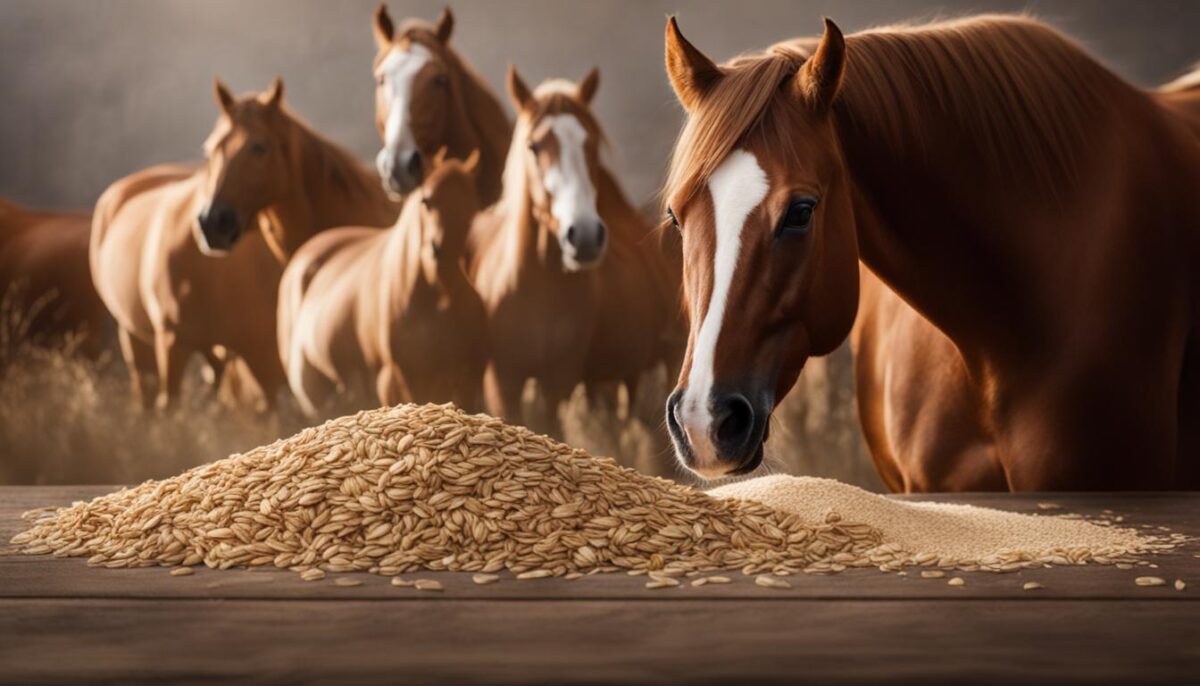As a horse owner or caretaker, you might be wondering about the safety of feeding oatmeal to your horses. Horses have been fed oats for a long time, and oatmeal can be a part of their equine diet. However, it’s important to understand that while oats are generally safe for horses, a balanced and nutritious horse feeding plan should include other foods as well. In this article, we’ll explore the pros and cons of including oatmeal in your horse’s diet and its overall safety for horses.
Key Takeaways:
- Oatmeal can be a safe part of an equine diet
- Horses enjoy the taste of oats
- A balanced horse feeding plan should include other nutritious foods
- Oatmeal lacks certain vital nutrients such as lysine that young horses need for growth
- Consult with an equine nutritionist to ensure proper meal plans for your horse
Understanding Horses’ Nutritional Needs
Just like people, horses need to eat a variety of foods to stay happy and healthy. Oats can be a tasty treat for horses, but they don’t provide all the essential nutrients necessary for optimal horse health. In order to maintain a horse’s well-being, it’s important to understand their specific dietary requirements.
Equine nutrition focuses on providing horses with the proper balance of nutrients, such as proteins, vitamins, and minerals. Besides oats, horses also require hay, fruits, vegetables, and special horse feeds to make sure they get all the nutrition they need.
Let’s take a look at some of the key components of a horse’s diet and why they are essential for maintaining horse health:
- Protein – helps horses build muscles and provides them with energy.
- Vitamins – essential for growth, development, and overall health. For example, Vitamin C supports the immune system and helps prevent diseases.
- Minerals – crucial for the formation and maintenance of bones, as well as other important bodily functions. Calcium is particularly important for strong bones and teeth.
To keep horses healthy, it’s vital to provide them with a balanced diet that includes the right amount of proteins, vitamins, and minerals.
| Nutrient | Function |
|---|---|
| Protein | Helps build muscles and provides energy |
| Vitamin C | Supports the immune system and overall health |
| Calcium | Crucial for strong bones and teeth |
By fulfilling your horse’s dietary requirements with a well-rounded meal plan, you can ensure they grow strong, stay healthy, and lead a happy life.
Traditional Role of Oats in Equine Diets
Oats have historically played a significant role in feeding horses. Horsemen have often favored this traditional horse feed due to its simplicity, safety, and palatability. As our understanding of equine nutrition developed, it became clear that oats, while a valuable component, should not be the only element in a horse’s diet. In this section, we will explore why oats have been the go-to choice for horse feed and their nutritional profile.
Why Horsemen Have Favored Oats Historically
Oats have consistently been a popular choice in historical equine diets due to several reasons. They were easily accessible, affordable, and notably less likely to cause health problems in horses when compared to other grains. Moreover, horses genuinely enjoy eating oats, which further boosted their popularity among horsemen.
The Nutrient Profile of Typical Oats
When it comes to oats nutrition, they offer a decent balance of horse feed components that benefit equine health. Oats are rich in protein and fiber, helping horses maintain strong muscles and digestive health. However, they do lack certain essential nutrients—particularly, lysine, an essential amino acid critical for muscle development in growing horses.
Oats contain more phosphorus and less calcium than what horses need, producing an imbalanced ratio that can negatively affect overall health.
It is crucial for horse owners to understand that although oats are a valuable part of a horse’s diet, they should not constitute the entire feed. To maintain optimal health, horses require a balanced diet that provides all the necessary nutrients in the right proportions.
| Nutrient | Amount in Oats | Importance for Horses |
|---|---|---|
| Protein | 9-13% | Supports muscle development and overall health |
| Fiber | 10-15% | Indispensable for proper digestion and gut health |
| Lysine | Limited Quantity | Crucial for muscle growth in young horses |
| Phosphorus and Calcium | Imbalanced ratio | Essential minerals for bone and dental health |
In conclusion, the popularity of oats in traditional horse feeding practices has roots in their accessibility, palatability, and relatively balanced nutrition. However, one should note that a horse’s diet must include other nutrient-rich feeds to ensure they receive all the essential elements required for optimal health and well-being.
The Safety and Palatability of Oats for Horses
Oats are known as a safe horse feed, providing horses with essential dietary fiber for their digestive system. While oats are tasty horse feed and preferred by many horses, it is important to ensure they receive a balanced diet. Let’s dive into the fiber content and digestibility of oats, and how they compare to other horse feeds.
Oats’ High Fiber Content and Digestibility
Oats contain a considerable amount of fiber from the hull, which plays an important role in the healthy digestion of horses. However, not all fiber in oats is easy for horses to digest and convert into energy. To provide horses with the most nutritious meal, it is crucial to select oats with the best digestibility, allowing for better energy production and overall wellbeing. Additionally, oats’ digestion is generally safer compared to highly processed sweet feeds, thanks to their high fiber content.
Horses’ Preference for Oats Over Other Feeds
Horses typically favor oats over other feeds due to their great taste, making them an optimal choice for their meal plan. However, it is essential to remember that horses have diverse dietary needs determined by factors such as age, activity level, and overall health. In some cases, like big races or shows, horses may require more than just oats to maintain peak performance. Therefore, even if oats are favored by horses, it is vital to incorporate various types of feeds that meet their nutritional requirements.
| Feed Type | Taste | Digestibility and Fiber | Role in Balanced Diet |
|---|---|---|---|
| Oats | Tasty and preferred by horses | High fiber content, but varying digestibility | Safe choice, but should be included as part of a balanced diet |
| Sweet Feed | Appealing to some horses | Generally lower fiber content, can pose risks to horse health | Considered a treat, should be fed in moderation |
| Complete Horse Feed | Mixed preferences by horses | Formulated to provide essential nutrients, can differ by brand | Important part of a well-rounded equine diet |
In conclusion, oats are a safe, tasty, and digestible option for horses. However, it is essential to prioritize a balanced diet, providing horses with the appropriate nutrients required for their specific needs. Always consult with a veterinarian or equine nutrition specialist to determine the best diet plan for your horse.
Oatmeal vs. Whole Oats: What’s Best for Your Horse?
When comparing horse feeds, it is important to understand the benefits of both oatmeal and whole oats to determine what is best for your horse’s diet. Each type of feed offers its own unique advantages, which we will discuss in this section.
Whole oats are the complete seed of the oat plant, including the hard outer hull. This hull provides a good source of fiber, which is essential for proper digestion in horses. On the other hand, oatmeal is made by removing the hull, leaving only the softer, inner part of the oat seed.
There are several benefits of oatmeal when it comes to horse nutrition. Removing the hard outer hull allows for easier digestion and absorption of nutrients. This makes oatmeal a more efficient source of energy for your horse, as they are able to break down and utilize the nutrients more effectively than whole oats.
However, whole oats also possess their own set of advantages. When fed in moderation, the extra fiber from the hull can support healthy digestion and prevent issues such as colic. The hulls also have a natural abrasive quality that can help keep your horse’s teeth clean and in good condition.
When deciding between oatmeal and whole oats for your horse, consider your horse’s individual needs and circumstances:
- Age: Younger horses may benefit more from oatmeal due to its easier digestibility and higher energy value.
- Activity level: High-performance horses may require the additional energy provided by oatmeal, while less active horses may do well on whole oats.
- Dental health: Horses with dental issues may prefer the softer texture of oatmeal, while those with healthy teeth can benefit from the abrasive action of whole oats.
- Digestive health: If your horse is prone to digestive problems, oatmeal may be the better option due to its higher digestibility.
In conclusion, both oatmeal and whole oats can have a place in a well-balanced equine diet. It is essential to monitor your horse’s health, activity level, and individual requirements to determine the optimal type of feed for their specific needs.
Can Horses Eat Oatmeal? Evaluating the Pros and Cons
So, can horses eat oatmeal? Yes, they can, but it’s not just about if they can eat it. It’s about if it’s a good choice for them. Oatmeal has its pros and cons when it comes to equine dietary choices. Let’s take a look at the key factors when planning the meal for your horse.
Oatmeal might not have enough of certain important things like lysine, which helps muscles grow. And if horses eat too much oatmeal and not other foods, they might not get all the nutrition they need. It’s like having only candy and no veggies. Also, oatmeal has a lot of something called starch, and too much can be too much of a good thing for horses. So it’s important to think about what else horses are eating to make sure they’re getting a balanced diet with all the good things they need.
In conclusion, horses can indeed eat oatmeal, but it’s essential to consider the pros and cons of oatmeal-based equine diets. Ensuring a well-balanced meal plan for your horse is integral for their health and wellbeing. So, while oatmeal may be part of their diet, remember to include other nutritious foods like hay, fruits, and vegetables to provide a complete, wholesome meal plan, tailored to the needs of your beloved equine companion.
FAQ
Can horses eat oatmeal?
Yes, horses can eat oatmeal, but it should be part of a balanced diet that includes other essential nutrients like vitamins, minerals, proteins, and fibers needed for proper growth and health.
What are the nutritional benefits of oats for horses?
Oats provide good amounts of protein, fiber, and energy to horses. They also contain phosphorus, but they lack enough calcium and lysine, which are important for a horse’s health.
Should I only feed my horse oatmeal?
No, feeding your horse only oatmeal will not provide a balanced diet. It’s essential to include other types of feeds, such as hay and specially formulated horse feed, for optimum health and strength.
What is the difference between oatmeal and whole oats for horses?
Oatmeal is the inner part of the oat, without the hard outer hull. Whole oats include the entire seed, with the hull. Oatmeal might be easier for some horses to digest and get energy from, but both can be nutritious options when included in a balanced diet.
How do oats help with horse digestion?
Oats contain high amounts of fiber from their hull, which aids in digestion. However, not all the fiber in oats is easy for horses to use for energy. Special oats that provide more digestible energy can be chosen for better horse nutrition.
Are oats a safe feed option for horses?
Yes, oats are generally safe for horses and have been a popular feed choice for a long time. They are easy to feed, and horses usually like the taste. However, it’s crucial to make sure horses receive a variety of feeds for a well-rounded diet and overall health.


